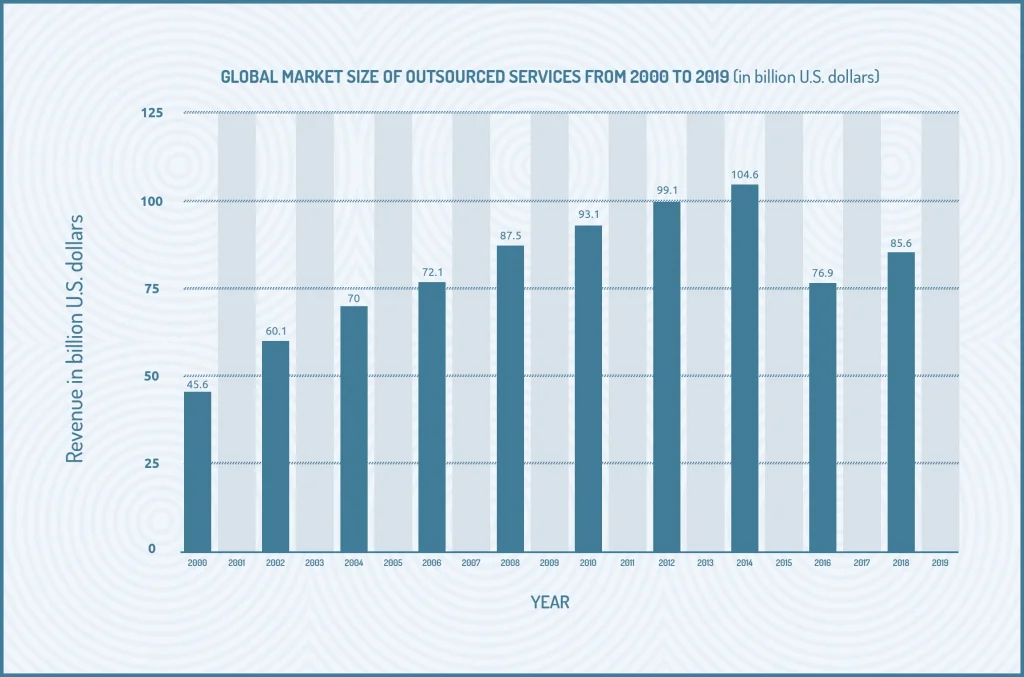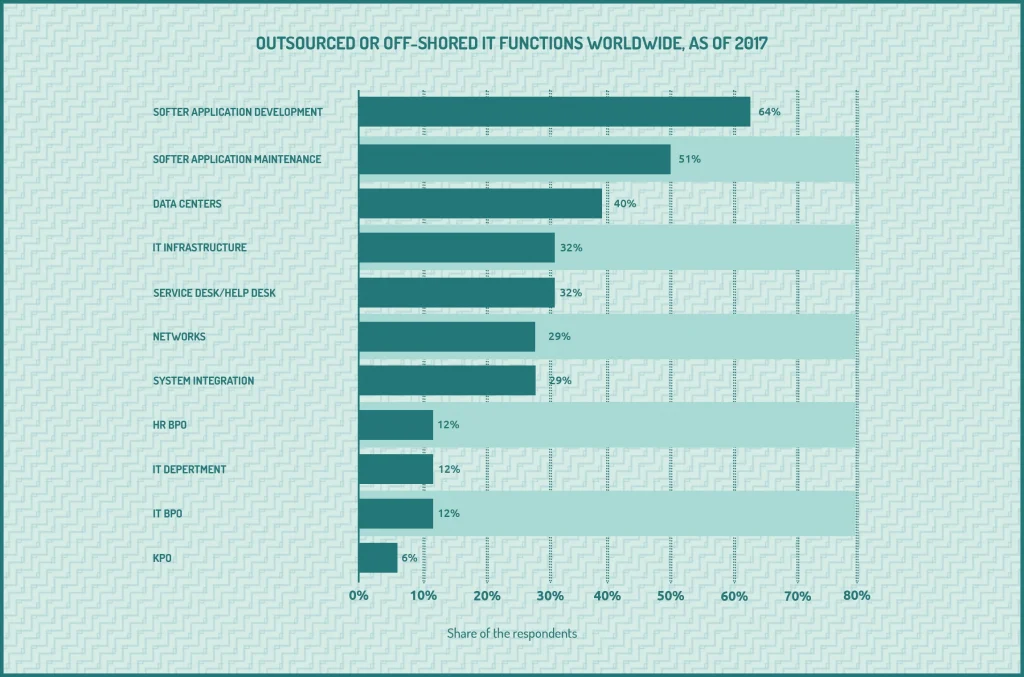Software development outsourcing has become mainstream in doing business. There are some disputes about the service, here and there, but the fact that in 2019 the IT offshoring market size amounted to $66.52 billion is a good enough reason to question whether outsourcing is something you should consider. The predictions also go in favor of outsourcing: Technavio’s study revealed that the global software outsourcing market will have a CAGR (Compound Annual Growth Rate) of 5% during the period 2020 – 2024. The demand for software development outsourcing is very high as more and more organizations are looking to optimize their business processes and lower costs.
At OSM, we have over twelve years of experience building first-class software, and we have been involved in outsourcing for quite some time. That’s why we’ve decided to summarize our knowledge about outsourcing software development, all the benefits, risks, and how to outsource software development properly so that you maximize the outcomes.
Table of Contents:
1. What is software development outsourcing?
2. Benefits of outsourcing software development
3. Cons of outsourcing software development
4. Outsourcing models
5. How to define your outsourcing strategy?
6. What are the most common phases of software development?
7. Often mistakes made with outsourcing your project
8. Best countries to outsource (based on data) and fees
9. Outsourcing with OSM
10. Summary
What is software development outsourcing?
To put it simply, outsourcing is delegating a certain task or a whole project to an external company, and it is a common practice in many industries. The statistics show that the global outsourcing market amounted to $92.5 billion in 2019.

Additionally, according to the latest statistics, software development outsourcing is the most popular outsourcing service in the tech industry.

The benefit of today’s digitalized business landscape is that companies have access to a wide choice of developers from all around the world. A company can opt for a cost-effective development team or a high-skilled one that couldn’t be found/afforded in a local community. This type of outsourcing is embraced both by well-established companies and startups.
Software development outsourcing is a common choice when it comes to developing custom software solutions by a third party. Some of the advantages outsourcing offers include downsizing costs, improving project quality, risk delegation, security enhancements, etc. We’ll cover all of this in the next chapters.
Benefits of outsourcing software development
The most common question when it comes to software development outsourcing is: Why should you choose this type of service instead of hiring an in-house team? Well, to put it simply:
Without the need for renting office space, setting up an entire development infrastructure, and putting together a professional team, outsourcing is faster and more cost-effective than in-house development.— explains Andrew Burak from Relevant.
10 reasons why to choose software development outsourcing:
#1 Get access to extensive knowledge, experience, and know-how
#2 Have pure professionals working on your project
#3 Enable cut-edge solutions
#4 Put together a team specializing in skills you actually need
#5 Create an optimum balance between skills & rates
#6 Leverage agile methodology
#7 Effective team communication
#8 Reduce micromanagement
#9 Reach a broader market
#10 Scale with ease
#1 Get access to extensive knowledge, experience, and know-how
If you lack internal resources, or you just want to focus on other tasks, outsourcing is a perfect solution. You need to have the initial product idea, but software development, consulting, design, maintenance, marketing, and other services is something you don’t need to worry about.
No matter if your product is in the MVP stage, or you want to upgrade it, there is a suitable combination of services that will help you to get the desired results. The majority of outsourcing companies can put together a team of experts with the necessary skills and experience that are just the right fit for your needs. Now, this is pretty difficult to build in-house, as it is both costly and time-consuming.
This way, by choosing to collaborate with an outsourcing company, you get a package with project planning, wireframing, UX/UI design, cost estimations, and much more. Of course, software development goes without saying.
Apart from having experts working on your project, outsourcing services enable you to get valuable insights and know-how that might be useful for your future projects. All the processes are pre-defined, the most useful tools are already chosen, and the team can probably predict various situations based on their previous experience and give beneficial recommendations.
#2 Have pure professionals working on your project
As mentioned above, the possibility to have a team tailored to your project is probably the main benefit of outsourcing. To have a successful project (launch), you need much more than someone to write the code. The team usually consists of DevOps, QA engineers, copywriters, marketers, UI/UX designers, and developers specialized in different fields (AI, VR, or a specific programming language).
Of course, a team like this is possible to arrange in-house, but finding and onboarding such a broad range of professionals can take a lot of time. And money.
Good software development outsourcing companies either have their poll of trusted professionals or can easily recruit the best ones on the market. This way, you will get a complete team of experts on board, with skills and experience you would surely struggle to find on your own.
#3 Enable cut-edge solutions
Companies often opt to outsource their development since they lack advanced technologies. External service providers that have a proven track record of quality can develop front-line solutions.
From expensive equipment to tools and valuable expertise and skills — a good outsourcing company will get you covered!
There’s even more to it. An experienced team can suggest the best combination of technologies, tools, equipment, and more. Perhaps there’s a solution you haven’t even heard about?
#4 Put together a team specializing in skills you actually need
We’ve already highlighted the benefits of outsourcing in terms of finding experts, but you often don’t need a team of seniors with a wide range of skills, or some superior technologies.
A good project manager will find a perfect combination of team members whose knowledge is relevant to execute the task associated just with your project. It is always good to have the best possible professionals on board, right? You never know when they can come in handy. But the thing is, they are expensive.
By choosing to outsource your development, you can get a team that is just the right fit for each project’s stage: for the MVP you might not need ten seniors specialized in VR, but later on, you can easily extend your team.
#5 Create an optimum balance between skills & rates
As previously mentioned, an outsourcing company can help you to work with experts relevant to your needs. Let’s be honest, this is the best-case scenario. What if you have a limited budget?
Outsourcing enables you to have an optimal balance of development skills and rates. Since the geographic reach of outsourcing options is broad, you can easily have an expert from a country that provides lower rates.
For example, software development companies operating in Serbia have a proven record of providing high-quality services at much lower rates than those in the US or Western Europe. If you entrust your project with such a company, you can get top-notch, professionally delivered products at a noticeably lower cost.
#6 Leverage agile methodology
Application of the agile methodology in the development process, especially for a startup, can often be critical. Agile allows seeing results of your product without all those unnecessary tasks that just lead to more expenses. This methodology supports the lean approach, ideal for avoiding project complexity, bad management, and poor team communication.
The general agile model is based on product creation sprints that usually last two weeks and have specific KPI. After the development and testing process is completed, the team can move to the next sprint. However, the main advantage of this approach is probably the possibility of being flexible, having revisions, and adapting to some new findings or budgets. This way, by the end of the project lifecycle, redoing finished components is reduced to a minimum.
#7 Effective team communication
Hiring an external agency to develop your product means that the communication must run smoothly. Fortunately, software development outsourcing agencies are usually equipped with a great set of communication tools, such as Slack, Jira, GitHub, and others.
Effective communication within the team is also something that outsourcing companies praise and take care of. No matter if the team is working remotely or from an office, a good outsourcing agency will provide a project manager that will handle all the onboarding processes, but also issues if some team members are temporarily unavailable.
#8 Reduce micromanagement
As explained at the very beginning, outsourcing your development team means that the outsourcing agency takes all the responsibility for managing the development team, no matter the size. That means that there is a dedicated project manager, and there’s no need for you to worry about any type of (micro)management. Yes, you can meet the project manager in the initial stage of your project development, but he would be the one who’ll coordinate the team, making sure that everything is in place (budget, estimates, agreed tasks, etc.). You would just need to approve everything the PM sets at the very beginning, and that’s it! At the sync meetings, you’ll be updated on the progress.
However, if you would like to learn more about the methodologies of successful management of a (remote) team, outsourcing can be a perfect opportunity. The majority of project managers have already tested various management tools and methods, so you can learn from the best.
All in all, the project manager will take care of designing sprints, setting and keeping track of the KPIs, deliveries, deadlines, and preparing reports. It is up to you to choose if you want to get involved, but, as highlighted above, there is no need for micromanagement.
In addition, by outsourcing, you can get a fresh perspective, new knowledge, and feedback that can result in improving not only your project but also the way you work as an individual.
#9 Reach a broader market
This one is a no-brainer. By working with an outsourcing agency, you get the chance to improve your performance, reach a greater, international audience, and perhaps even establish valuable business relationships. Outsourcing can help you to grow your business in a way you probably couldn’t manage with in-house capacities!
#10 Scale with ease
When it comes to project development, the scope of the project may grow or be reduced. If you apply agile methodologies, it won’t be that difficult to implement needed changes, scale or downsize the initial team.
You can just add more team members, or reduce the number of the existing ones. This would be pretty difficult to handle in-house, wouldn’t you agree? An outsourcing agency can quickly find a replacement for a team member, or add one with the needed skills.
Just imagine working in-house and having to reduce the number of people in your company: you’ll either have to let people go and risk being unable to replace their skill set if needed or continue compensating their salaries just to have them on board.
Software development outsourcing enables you to avoid all of these issues.
These are just some of the benefits software development outsourcing has to offer.
The practice of startup outsourcing has been around for quite a while, with a list of successfully outsourced projects such as Opera and Slack. Do you want to join this satisfied and successful crowd?
Cons of outsourcing software development
Of course, software development outsourcing has its flows. No, it is not a suitable solution for every business, every project. Assigning your project to a completely unknown team has a certain risk. Even if you check the reputation of the outsourcing agency, have positive feedback and first impressions, there’s still a chance that they just won’t be a good fit.
For example, there can always be a communication issue, delays in sprints execution, or simply the team members won’t meet your expectations. In addition, you probably won’t have access to company internal processes, labor conditions, and similar.
So, how can you leverage all the above-mentioned benefits of software development outsourcing with all the challenges it carries?
- Choose your outsourcing agency carefully, do in-depth due diligence, do a background check of the company and team members potentially involved in your project.
- Go ahead and ask some of their previous clients for feedback.
- If possible, test the outsourcing agency by working on a smaller project, or even better a task. Just make sure that you have all the deadlines, criteria, budget, and other details well defined.
- Some agencies don’t welcome small projects/tasks. If that’s the case with the one you’ve chosen, try to customize the contract so that it can be terminated if you are not satisfied with the first month of your collaboration.
- This goes without saying, but get at least three offers before the final decision is made.
Outsourcing models
There are three main models of outsourcing that you’ll find in almost every software development outsourcing agency: time and material, project-based price (fixed), and hiring a dedicated team. To get the most out of the outsourcing service, it is recommended that you explore all three options and see which one is suitable for your project.
1. Time and material
Perhaps you are not familiar with the term time and material, however, you’ve surely heard of the hourly development rate. If you choose the time and material model, you’ll pay for the time (hours) the development team spent working on your project, multiplied by the hourly fee.
Advantages:
- Ideal for working with agile since the plan can easily be adjusted according to (un)expected circumstances.
- You’re more involved in the whole process since, as a client, you’ll get a detailed report on the time spent.
- A good model for smaller projects that don’t require a big team since you can easily understand what each team member is working on, what stage the whole process is in, etc.
Disadvantages:
- If you don’t want to be that involved in the development (or you simply just don’t have the time), then this isn’t a model for you, as explained above.
- Budget estimations can be quite a challenge, however, this is something that you can overcome by predefining and making it clear to the outsourced PM that you don’t want to spend more than that amount.
- The time and material model requires a lot of communication which can slow down the whole development process.
2. Project-based (fixed price):
To start working on a project-based model means that all the specifications, project scope, and price must be in place. This can sometimes be pretty hard to pre-define, but if your project isn’t that big, or you want to test a new outsourcing agency, a project-based contract can be a great solution.
Advantages:
- There’s no guessing about the outcomes. You get what you agree on.
- It is more likely that the project will be delivered on time since the deadlines are also pre-defined.
Disadvantages:
- The pre-definements carry a certain risk — there’s no room for flexibility and adaptability. Well, unless you state otherwise in the contract.
3. Dedicated team:
If you outsource a dedicated team for your development project, you’ll basically pay a fixed salary for each hired specialist, but without other (hidden) costs. For long-term projects or the ones that don’t have clear requirements yet, this type of outsourcing is pretty suitable.
Advantages:
- The main advantage of this collaboration is that the client has full control over the team’s workload and many other details, depending on the client. Just think of it as a remote team that you can manage from anywhere in the world.
- No administrative costs, no onboarding hassle.
Disadvantages:
- Since the project doesn’t have specified requirements, it can sometimes be very difficult to make predictions, in terms of budgets, time estimates, etc. Well, in some cases, this can be an advantage since it leaves a lot of room for creativity.
Here’s a quick summary:

How to define your outsourcing strategy?
Now that you’ve got more familiar with the outsourcing models, their pros and cons, it is time to work towards the creation of an outsourcing strategy suitable for your project. Here’s what you should predefine before you even start searching for an outsourcing agency:
- Goals you want to achieve with outsourcing
- Project goals
- Tasks that you don’t mind outsourcing
- Timeline(s)
- A technological profile you are seeking
What are the most common phases of software development?
Knowing the software development life cycle makes it easier to choose the right vendor you should outsource to. That way, you can plan each step in advance, have a list of questions prepared for the meetings, etc.
Usually, software development goes through the following phases:
- Ideation
- Planning
- Design
- Coding
- QA
- Support and maintenance
Best countries to outsource (based on data) and fees
There are several factors you should consider when narrowing down the list of potential software outsourcing companies. The main things you want to look for are:
- What are the costs (a no-brainer, of course)?
- How developed is the IT market in the country the agency is based in?
- Can you communicate with the agency in your preferred language?
- Is there a significant cultural difference that might impact the collaboration?
- Is the time zone appropriate for the overall communication?
Once you’ve figured out all the details, it is time to start looking for vendors in the best countries for development outsourcing.
Here’s a list of countries that have a proven track record of software development outsourcing (in no particular order) with annual software developer salaries, just so you know what to expect:
- India ($11,139)
- Ukraine (between $11,936 and $46,787)
- Serbia (between $13,400 and $72,000)
- Poland ($22,273.88)
- Romania (12,000 to $35,000)
- Brazil (between ($6,009.26 and $33,054.78)
- Canada ($47,659.67)
- Taiwan ($23,427)
- Philippines ($10,563.40)
- China (between $27,695.96 and $52,314.59)
Of course, there are many other options, but if you are just starting to look for an outsourcing agency, this list might come in handy.
Often mistakes made with outsourcing your project
Many businesses outsource their projects simply because they do not have enough technical expertise and experience to pursue in-house development. On the other hand, they also reach out to software, web, or, app developers in other parts of the globe to hire the best resources at a highly competitive cost.
But outsourcing strategy can backfire if you are not aware of certain common flaws and mistakes. Here we explain some of the key mistakes common with outsourcing projects that you must avoid.
#1 Not carrying adequate research
Many entrepreneurs because of their extreme enthusiasm to build and launch the project at the earliest just fail to consider several options and research a lot of companies before finalizing one. They often forget that they need developers with enough experience, expertise, and skills. This also happens because of their losing focus on preparing the product requirements to document well in advance.
In order to carry out proper and extensive market research to get onboard the best development company, you first need to prepare a solid requirement doc mentioning every technical aspect, feature, and required skill. This will help you find the companies with the right skills and expertise.
#2 Not having proper communication
It is extremely important to ensure transparent communication between the client and the development outsourcing company so that the project is handled by keeping both parties in sync regarding the progress and evolving requirements.
Simply finding a top-notch outsourcing company does not guarantee to deliver a product that outwits competition and catches the wind of success. The probability of committing development errors continues to pull back the potential of many app projects. Often this results from a lack of communication. There should be scheduled communication with proper channels and responsibilities fixed on designated individuals.
#3 Not having clear-cut requirements
A key mistake for many projects is to give vague examples of other products instead of providing a clear and well-articulated document mentioning all the project requirements in detail. This often results in an unsatisfactory user experience or products that do not offer a unique look and feel.
Clients should provide very clear requirements at the very beginning of the project and mention all the technical requirements as well as the business objectives and purposes the product is going to serve. Developers have a clear idea about the specific UX and UI requirements of the project and the deadlines and milestones of the project that they need to adhere to.
#4 Absence of source code protection
Not protecting the source code can trigger a lot of troubles for the product in the long run. When you want to outsource the project to a development company from another part of the globe, you must ensure that you own the source code and you do not have future obligations to seek the help of the same developers for app edits and updates.
On top of that, when the client during the development asks for the source code or does the same following the completion of the project, you should not be charged any additional cost for this. To get rid of these problems once and for all, the company has to make sure that the clause remains constant in the contract with the development company.
#5 Not considering time zone differences
Mobile app projects, for example, often involve frequent changes, value additions, and app updates. The development process is far from just a one-time endeavor. Naturally, you need to get onboard developers who can be easily contacted when you need them. This is why you need to engage developers with minimum differences in respect to time zones.
When the time zone difference is too big, there is likely to be a bigger communication gap resulting in poor syncing of requirements and project updates on both parts.
To avoid issues, we can advise you to opt for a development company close to your time zone.
#6 Making price too much of an issue
There can be hardly any doubt that competitive pricing remains a key consideration to choosing an outsourcing development company for your projects. But when you give pricing more importance than it really deserves, the project may suffer. There are many instances when clients by simply going with the low-budget company actually get a very compromising product delivered.
If you are serious enough to achieve the project objectives for your business, you should rather take very balanced decisions. You should give priority to the quality first, thereafter among the same standard of companies you can choose the best rate and pricing
Outsourcing with OSM
With over a decade of experience in software development, we have decided to expand our services and help our international clients to achieve strategic goals better, faster, and without burning a hole in their budget.
Our team has plenty of experience helping clients in the first development stages such as ideation and conceptualization. Additionally, we have also been involved in creating an MVP and then the final product. That’s why we are pretty confident to say that by outsourcing your development to OSM, you’ll be pleased to work with top-notch software professionals that we handpick to meet your needs and goals.
Both startups and well-established companies trust us to recruit, train, and onboard experts from our local IT community. Learn more about our outsourcing services, and let’s see if OSM can be a good fit for your project.
Summary
Outsourcing is definitely much more cost-effective, more convenient, and faster than having an in-house development team. However, not every project is suitable for outsourcing, and not every vendor is a good solution for you. There are several reasons why you should outsource, and you should take into account many factors when choosing an outsourced team.
We hope that this article has shed some light on outsourcing and helped you to decide whether this is something you should explore. For any other questions, concerns, or advice, don’t hesitate to drop us a line.





